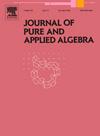Factorization of polynomials over the symmetrized tropical semiring and Descartes' rule of sign over ordered valued fields
IF 0.8
2区 数学
Q2 MATHEMATICS
引用次数: 0
Abstract
The symmetrized tropical semiring is an extension of the tropical semifield, initially introduced to solve tropical linear systems using Cramer's rule. It is equivalent to the signed tropical hyperfield, which has been used in the study of tropicalizations of semialgebraic sets. Polynomials over the symmetrized tropical semiring, and their factorizations, were considered by Quadrat. Recently, Baker and Lorscheid introduced a notion of multiplicity for the roots of univariate polynomials over hyperfields. In the special case of the hyperfield of signs, they related multiplicities with Descartes' rule of signs for real polynomials. More recently, Gunn extended these multiplicity definitions and characterization to the setting of “whole idylls”. We investigate here the factorizations of univariate polynomial functions over symmetrized tropical semirings, and relate them to the multiplicities of roots over these semirings. We deduce Descartes' rule for “signs and valuations”, which applies to polynomials over a real closed field with a convex valuation and an arbitrary (divisible) value group. We show in particular that the inequality of Descartes' rule is tight when the value group is non-trivial. This extends a characterization of Gunn from the rank one case to arbitrary value groups, also answering the tightness question. Our results are obtained using the framework of semiring systems introduced by Rowen, together with model theory of valued fields.
对称热带半环上多项式的因式分解及有序值域上的笛卡儿符号规则
对称热带半环是热带半场的扩展,最初是用来用克莱默规则求解热带线性系统。它等价于已用于半代数集热带化研究的符号热带超场。用Quadrat方法研究了对称热带半环上的多项式及其分解。最近,Baker和Lorscheid为超域上的单变量多项式的根引入了多重性的概念。在符号超场的特殊情况下,他们将多重性与实多项式的笛卡儿符号规则联系起来。最近,Gunn将这些多样性定义和特征扩展到“整个田园诗”的设置。本文研究了对称热带半环上单变量多项式函数的因式分解,并将其与这些半环上根的多重性联系起来。我们推导了笛卡尔的“符号和赋值”规则,该规则适用于具有凸赋值和任意(可除)值群的实闭域上的多项式。我们特别证明了当值群是非平凡的时,笛卡尔规则的不等式是紧的。这将Gunn的特征从秩一情况扩展到任意值群,也回答了紧性问题。我们的结果是利用Rowen引入的半环系统框架,结合值域模型理论得到的。
本文章由计算机程序翻译,如有差异,请以英文原文为准。
求助全文
约1分钟内获得全文
求助全文
来源期刊
CiteScore
1.70
自引率
12.50%
发文量
225
审稿时长
17 days
期刊介绍:
The Journal of Pure and Applied Algebra concentrates on that part of algebra likely to be of general mathematical interest: algebraic results with immediate applications, and the development of algebraic theories of sufficiently general relevance to allow for future applications.

 求助内容:
求助内容: 应助结果提醒方式:
应助结果提醒方式:


